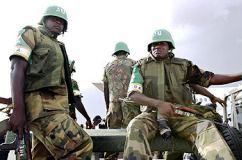AU said opposed to UN command for Darfur hybrid force
June 1, 2007 (UNITED NATIONS) — The African Union has objected to a proposal for a 23,000-strong AU-U.N. force to help end the bloodshed in Darfur because it would give the United Nations command and control, U.N. diplomats said Friday.
 The African Union wants joint control of the force, the final phase of a three-stage U.N. plan to bolster the beleaguered 7,000-strong AU force currently on the ground in Darfur, U.N. diplomats said, speaking on condition of anonymity because negotiations to resolve the dispute are private.
The African Union wants joint control of the force, the final phase of a three-stage U.N. plan to bolster the beleaguered 7,000-strong AU force currently on the ground in Darfur, U.N. diplomats said, speaking on condition of anonymity because negotiations to resolve the dispute are private.
The United Nations announced on May 24 that the AU and U.N. had agreed on the proposal for the hybrid force, and it was handed to Sudan’s U.N. Ambassador Abdalmahmood Abdalhaleem Mohamad the following day. But on Friday, Secretary-General Ban Ki-moon was forced to backtrack.
He told reporters after briefing the Security Council that it was “unfortunate” that the African Union has problems with the hybrid force proposal. He did not disclose the problems.
“There was very close consultation between the African Union and the United Nations on this joint proposal,” Ban said. “We are now working to have clarifications on some elements of the draft.”
“It was unfortunate that the African Union has come back with some changes after the Security Council has adopted and issued a presidential statement. But I think on the basis of a spirit of cooperation and unity in working and addressing this Darfur situation, I am quite confident that the African Union and the U.N. will find common understanding on this issue,” he said.
The presidential statement adopted last Friday by the council welcomed the transmission of the proposal for the hybrid force to Sudan and urged all parties to meet their obligations.
Ban has called for technical talks on the hybrid proposal on June 5-6 in Addis Ababa, Ethiopia, and on Thursday, Sudan’s Mohamad said his country would attend. U.N. officials said Friday they expect the meeting to go ahead.
Last November, Sudanese President Omar Al-Bashir agreed to the three-stage package to strengthen the AU force. Al-Bashir has since backtracked on accepting U.N. troops and approval of the hybrid force remains a question mark.
The four-year conflict between ethnic African rebels and pro-government janjaweed militia in the vast western Darfur region has killed more than 200,000 people and displaced 2.5 million Darfurians. A beleaguered, 7,000-strong African Union force has been unable to stop the fighting, and neither has a peace agreement signed a year ago by the government and one rebel group.
After five months of stalling, the Sudanese president gave the go-ahead for the second phase in mid-April — a “heavy support package” with 3,000 U.N. troops, police and civilian personnel along with six attack helicopters and other equipment.
Ban said the entire international community “has been frustrated many times over the lack of progress” in ending the Darfur conflict.
But he said that since taking over as secretary-general in January, he believes he has made “some progress, even though slow,” including agreement on the heavy support package and preparing the hybrid proposal.
Ban said he spoke to Al-Bashir in the past few days and “he is also committed to see early resolution of this issue.”
On the political front, the secretary-general said, U.N. envoy Jan Eliasson is trying to arrange a “pre-negotiation phase” with rebel groups in June and July, “and I hope that before August we will be able to enter into the negotiation phase in political dialogue.”
Ban also pointed to a new agreement on humanitarian access between Sudan and the United Nations.
“This process may be slow, painful, but I think we are moving towards early resolution of this issue,” he said.
China buys two-thirds of Sudan’s oil and has close commercial ties with Khartoum and some campaigners for an end to the Darfur conflict have called for a boycott of the 2008 Beijing Olympics if there is no solution — but Ban disagreed.
“The Chinese government has also been exerting their utmost efforts,” he said, pointing to a new Chinese envoy for Darfur, the Chinese president’s visit in February, and other Chinese diplomatic efforts.
“I appreciate such a Chinese government role,” Ban said. “It is helpful.”
(AP)
